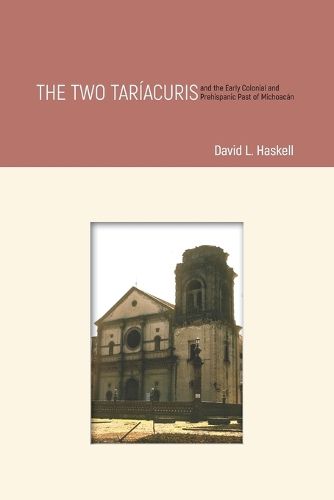Readings Newsletter
Become a Readings Member to make your shopping experience even easier.
Sign in or sign up for free!
You’re not far away from qualifying for FREE standard shipping within Australia
You’ve qualified for FREE standard shipping within Australia
The cart is loading…






The Two Tariacuris and the Early Colonial and Prehispanic Past of Michoacan investigates how the elites of the Tarascan kingdom of Central Mexico sought to influence interactions with Spanish colonialism by reworking the past to suit their present circumstances. Author David L. Haskell examines the rhetorical power of the Relacion de Michoacan–a chronicle written from 1539 to 1541 by Franciscan friar Jeronimo de Alcala based on substantial indigenous testimony and widely considered to be an extremely important document to the study of early colonial relations and the prehispanic past. Haskell focuses on one such testimonial, the narrative of the kingdom’s Chief Priest relaying the history of the royal family. This analysis reveals that both the structure of that narrative and its content convey meaning about the nature of rulership and how conceptualizations of rulership shaped indigenous responses to colonialism in the region.
Informed by theoretical approaches to narrative, historicity, structure, and agency developed by cultural and historical anthropologists, Haskell demonstrates that the author of the Relacion de Michoacan shaped, and was shaped by, a culturally distinct conceptualization and experience of the time in which the past and the present are mutually informing. The book asks, How reliable are past accounts of events when these accounts are removed from the events they describe? How do the personal agendas of past chroniclers and their informants shape our present understanding of their cultural history? How do we interpret chronicles such as the Relacion de Michoacan on multiple levels? It also demonstrates that answers to these questions are possible when attention is paid to the context of narrative production and the narratives themselves are read closely.
The Two Tariacuris and the Early Colonial and Prehispanic Past of Michoacan makes a significant contribution to the scholarship on indigenous experience and its cultural manifestations in Early Colonial period Central Mexico and the anthropological literature on historicity and narrative. It will be of interest to Mesoamerican specialists of all disciplines, cultural and historical anthropologists, and theorists and critics of narrative.
$9.00 standard shipping within Australia
FREE standard shipping within Australia for orders over $100.00
Express & International shipping calculated at checkout
The Two Tariacuris and the Early Colonial and Prehispanic Past of Michoacan investigates how the elites of the Tarascan kingdom of Central Mexico sought to influence interactions with Spanish colonialism by reworking the past to suit their present circumstances. Author David L. Haskell examines the rhetorical power of the Relacion de Michoacan–a chronicle written from 1539 to 1541 by Franciscan friar Jeronimo de Alcala based on substantial indigenous testimony and widely considered to be an extremely important document to the study of early colonial relations and the prehispanic past. Haskell focuses on one such testimonial, the narrative of the kingdom’s Chief Priest relaying the history of the royal family. This analysis reveals that both the structure of that narrative and its content convey meaning about the nature of rulership and how conceptualizations of rulership shaped indigenous responses to colonialism in the region.
Informed by theoretical approaches to narrative, historicity, structure, and agency developed by cultural and historical anthropologists, Haskell demonstrates that the author of the Relacion de Michoacan shaped, and was shaped by, a culturally distinct conceptualization and experience of the time in which the past and the present are mutually informing. The book asks, How reliable are past accounts of events when these accounts are removed from the events they describe? How do the personal agendas of past chroniclers and their informants shape our present understanding of their cultural history? How do we interpret chronicles such as the Relacion de Michoacan on multiple levels? It also demonstrates that answers to these questions are possible when attention is paid to the context of narrative production and the narratives themselves are read closely.
The Two Tariacuris and the Early Colonial and Prehispanic Past of Michoacan makes a significant contribution to the scholarship on indigenous experience and its cultural manifestations in Early Colonial period Central Mexico and the anthropological literature on historicity and narrative. It will be of interest to Mesoamerican specialists of all disciplines, cultural and historical anthropologists, and theorists and critics of narrative.